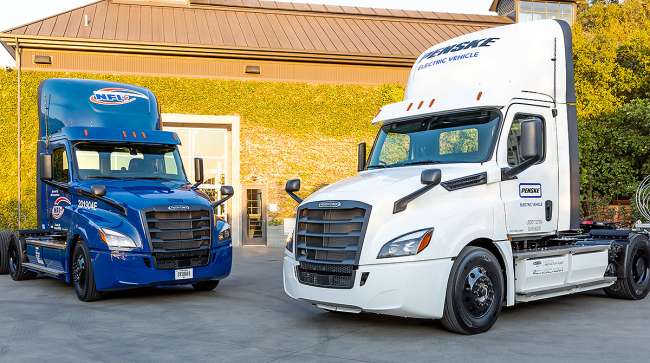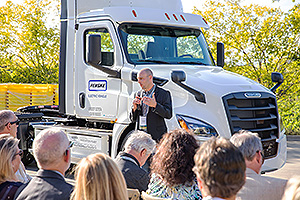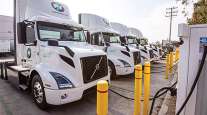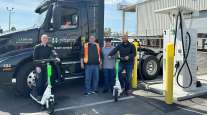Managing Editor, Features and Multimedia
First Electric Freightliner eCascadia Models Enter Freight Operations at NFI, Penske

[Stay on top of transportation news: Get TTNews in your inbox.]
YOUNTVILLE, Calif. — Daimler Trucks North America has handed over its first two battery-electric Freightliner eCascadia models to NFI and Penske Truck Leasing for use in their daily freight operations.
These Class 8 tractors will begin hauling cargo in Southern California, but more significantly, they will help pave the way for the full commercialization of electric-powered trucks in North America.
DTNA celebrated the milestone Aug. 20 here at Cliff Lede Vineyards with executives from NFI and Penske and members of the trade press.
I got a great opportunity to test drive the battery-electric Freightliner eCascadia. It’s amazing to experience such a smooth, quiet ride in a Class 8 truck. @DaimlerTrucksNA #emobility pic.twitter.com/LIvGhqL1a7 — Seth Clevenger (@SethClevenger) August 21, 2019
“This is revolutionary. This is the start of a major change in the way companies will operate in the future,” Sid Brown, NFI’s CEO, told Transport Topics at the event.
“You don’t get a chance too often in your lifetime to be at the forefront of a technological revolution,” he added.
Richard Howard, DTNA’s senior vice president of sales and marketing, said the first eCascadias were the result of a “co-creation” process between the truck maker and its fleet customers, and hailed the official handoff of the trucks to NFI and Penske as “an extremely special moment.”
The heavy-duty eCascadia and its smaller sibling, the medium-duty eM2, are slated to enter series production in late 2021.
Ahead of that broader rollout, NFI and Penske are acting as pioneers by deploying the first iterations of those vehicles in real-world operating conditions.
These initial test trucks, dubbed the Freightliner Electric Innovation Fleet, will enable DTNA and the fleets to build knowledge about how best to implement the technology.
DTNA plans to expand this test fleet to a total of 20 eCascadias and 10 eM2s, a target the manufacturer aims to achieve by the end of this year, said Andreas Juretzka, director of product development for e-mobility.
“We are excited,” he said. “We are hoping for so much feedback so we can tune it into our future product.”
Juretzka also characterized these first steps toward commercial vehicle electrification, particularly in the Class 8 segment, as a “huge moment” for the industry.
Advances in battery technology have created a real chance for electric propulsion to eventually overtake internal combustion engines, he said.
But the integration of electric vehicles into trucking operations will be a long journey.

Michael Scheib by Daimler Trucks North America
“This is just the first small step,” said Michael Scheib, director of e-mobility platform at DTNA. “This is going to be a long and winding road until we scale up this technology to make it mainstream in this industry.”
In the near term, electric trucks will be best suited to shorter routes.
NFI plans to put its eCascadias to work in port drayage operations, hauling freight between the Los Angeles-Long Beach port complex and warehouses in Southern California, where air quality requirements are set to become much more stringent.
To meet those targets, “you have to go big,” said Matt Miyasato, deputy executive officer for science and technology advancement at the South Coast Air Quality Management District, which partially funded the Innovation Fleet with a nearly $16 million grant.
The greater Los Angeles region suffers from the worst air quality in the nation, Miyasato said, highlighting the value of zero-emission trucks for that region.
“From an environmental standpoint, this is absolutely the best way to go,” NFI’s Brown said.
For Penske Truck Leasing, operating the eCascadias and eM2s will enable the company to build expertise in this emerging technology and share that knowledge with its truck leasing customers.
“We are always evaluating the latest technology because our customers are demanding that from us, so we want to make sure we understand what is out there and what is available,” said Paul Rosa, senior vice president of procurement and fleet planning at Penske Truck Leasing. “We’re just over the moon about the opportunity to put a vehicle like this in the hands of our logistics team.”
Penske plans to utilize its eCascadias in dedicated shorthaul applications in Southern California.
“This is going to transform the industry,” Rosa said. “When drivers get a chance to get into this type of vehicle, they’re not going to want to go into something else.”
.@DaimlerTrucksNA marks the delivery of its first two battery-electric Freightliner eCascasdia models to Penske and NFI here in Napa Valley. pic.twitter.com/RWrH8QRWh1 — Seth Clevenger (@SethClevenger) August 21, 2019
NFI’s Brown said his company’s fleet is an ideal fit for electrification because the vast majority of its vehicles return to base each day.
Looking ahead, Brown believes further improvements in battery technology will expand the range of electric trucks in the coming years, which would clear the way for further adoption.
“I see by 2025, about 60% of our fleet will probably be electric,” Brown said. “We’re a big believer.”
He also envisions installing solar panels at NFI’s warehouses to help power its future fleet of electric trucks.
In addition to the environmental impact, Brown believes electric trucks could ease the burden on maintenance shops and help address the technician shortage because the vehicles have far fewer parts than diesel trucks — and none of the diesel aftertreatment systems.
Electric trucks also run much more quietly than diesels, which could allow trucks to operate at warehouses during the night without noise violations, and therefore take some truck traffic off the road during the day, he said.




